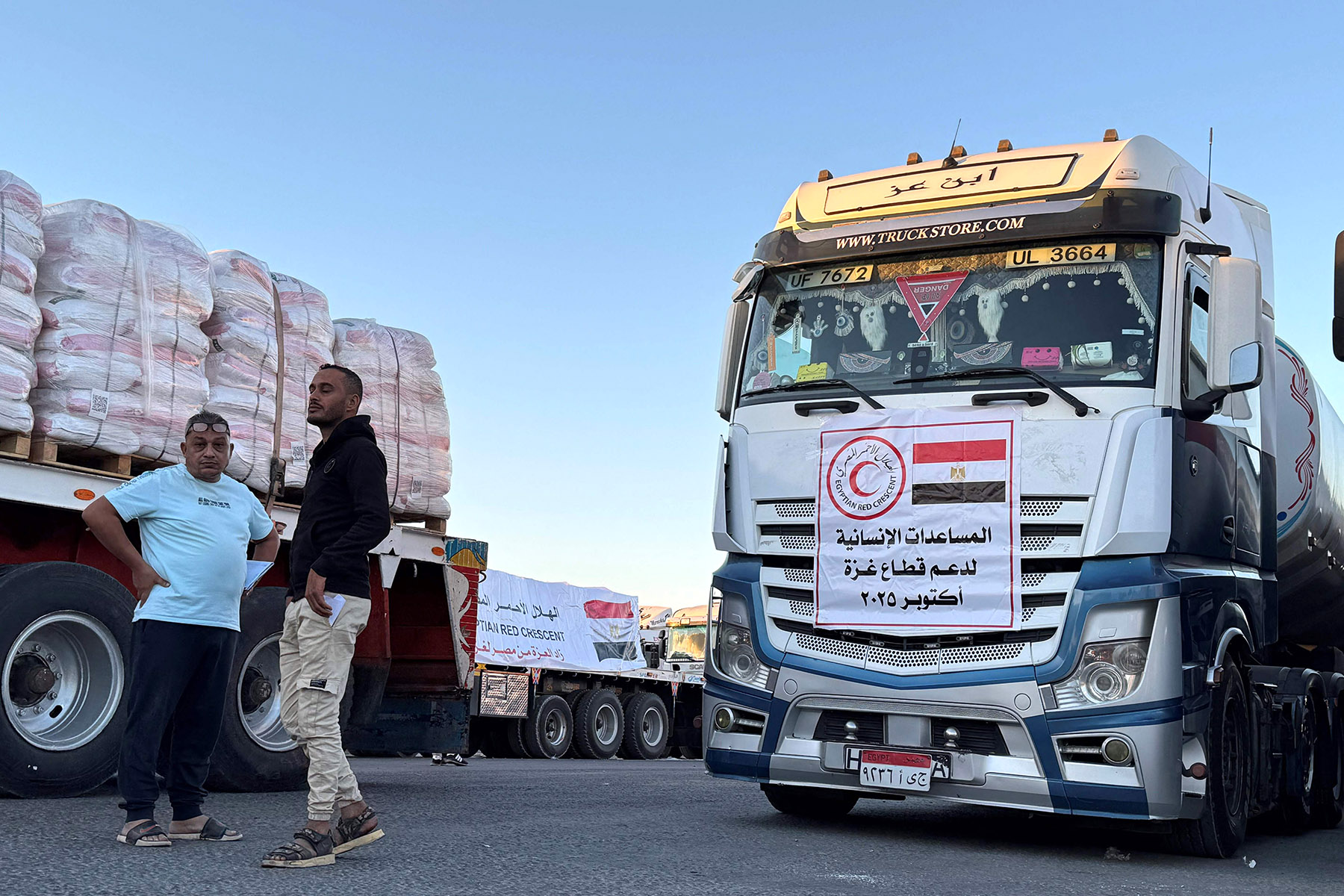Delivery of Gaza supplies reported cut due to delay in turning over hostages

Israel has been urged to ensure the smooth flow of humanitarian aid into Gaza as Hamas says it faces difficulties in returning the bodies of all the dead hostages it had held because of mass destruction and the positioning of Israeli troops in about half the territory.
Israel was reported to have halted the reopening of the Rafah border crossing and severely cut the delivery of aid over the pace of retrieval, citing the slow delivery of about 20 more bodies of hostages that Hamas had held in Gaza.
Hamas handed over four additional bodies believed to be Israeli hostages to the International Committee of the Red Cross on Tuesday, bringing the total to eight, but Israel has said it suspects one of the bodies of the latest four handed over is a Palestinian.
READ MORE: Summit on Gaza held as next phase of talks begins
Al Jazeera Arabic quoted the director general of Gaza's Government Media Office, Ismail al-Thawabta, as saying he had called on Israel to open the crossings and to allow aid into the enclave "immediately".
The United States needs to pressure Israel to ensure the opening of the crossings, and Palestinians in the enclave lack water and the ability to access water, he said.
Farhan Haq, a deputy spokesman for the United Nations Secretary-General, said on Tuesday that the UN and its partners would continue scaling up operations under a 60-day response plan to reach as many people as possible.
"Much more can be done, and for this to happen, as we said, we need more crossings to open, as well as the sustained entry of fuel and cooking gas; security guarantees for convoys; basic infrastructure to be restored; protection of humanitarian workers; the facilitation of NGO access, including through ensuring they are not de-registered; and the rapid injection of funding to support humanitarian operations."
An Israeli security official said on Wednesday that preparations were underway to open Rafah to Gazan citizens, while a second official said that 600 aid trucks would go in.
Hamas and Israel continued to accuse each other of violating the fragile ceasefire.
Hamas had sought more time to search for the dead hostages, and Xinhua News Agency quoted a spokesman, Hazem Qassem, as saying that the technical and logistics challenges resulting from the massive destruction pose serious obstacles to identifying and recovering the bodies.
The Red Cross has said recovery teams may be unable to find some bodies.
Because Israel has largely reduced the Gaza Strip to rubble and has kept its forces in more than half the territory, Israel had acknowledged that retrieving the bodies would be very difficult, and that it could take weeks or even months to get to those bodies, Al Jazeera reported.
The Israeli hostage negotiator Gershon Baskin told CBS News that there would be difficulty in returning the bodies of captives because several Hamas commanders who had buried such bodies were killed, and the bodies could be buried deep, given the scale of destruction.
Jaco Cilliers, United Nations Development Programme Special Representative of the Administrator for the Palestinian people, said in Jerusalem that the destruction in Gaza "was almost beyond comprehension".
The World Health Organization said 15,600 people, including 3,800 children, need medical evacuation.
A WHO spokesman, Tarik Jasarevic, said that the organization had deployed an emergency medical team within 24 hours to boost surgical and emergency care at Al-Ahli Hospital, with more deployments planned in Gaza City as people begin to return.
The WHO had also brought eight trucks of medical supplies into Gaza, including insulin, laboratory supplies and essential medicines.
ALSO READ: Israel orders military to prepare to resume Gaza assault if truce collapses
The UN said in a post on X that the ceasefire in Gaza has allowed it "to step up efforts to clear rubble so humanitarian aid can reach communities in need and for people to move safely".
UN personnel are also supporting hospitals and other essential services to clear debris and help restore access to care, it said.
The World Food Programme said 137 trucks had entered Gaza, supporting bakeries, nutrition and food distribution. It said 170,000 metric tons of food were ready to be moved to help feed 2 million people.
However, in the West Bank on Wednesday there were reports of Israeli forces allegedly beating a man to death in the town of al-Ram, north of occupied Jerusalem, and the kidnapping of four citizens from the village of Beit Ur al-Fauqa, west of Ramallah.
Contact the writers at jan@chinadailyapac.com


